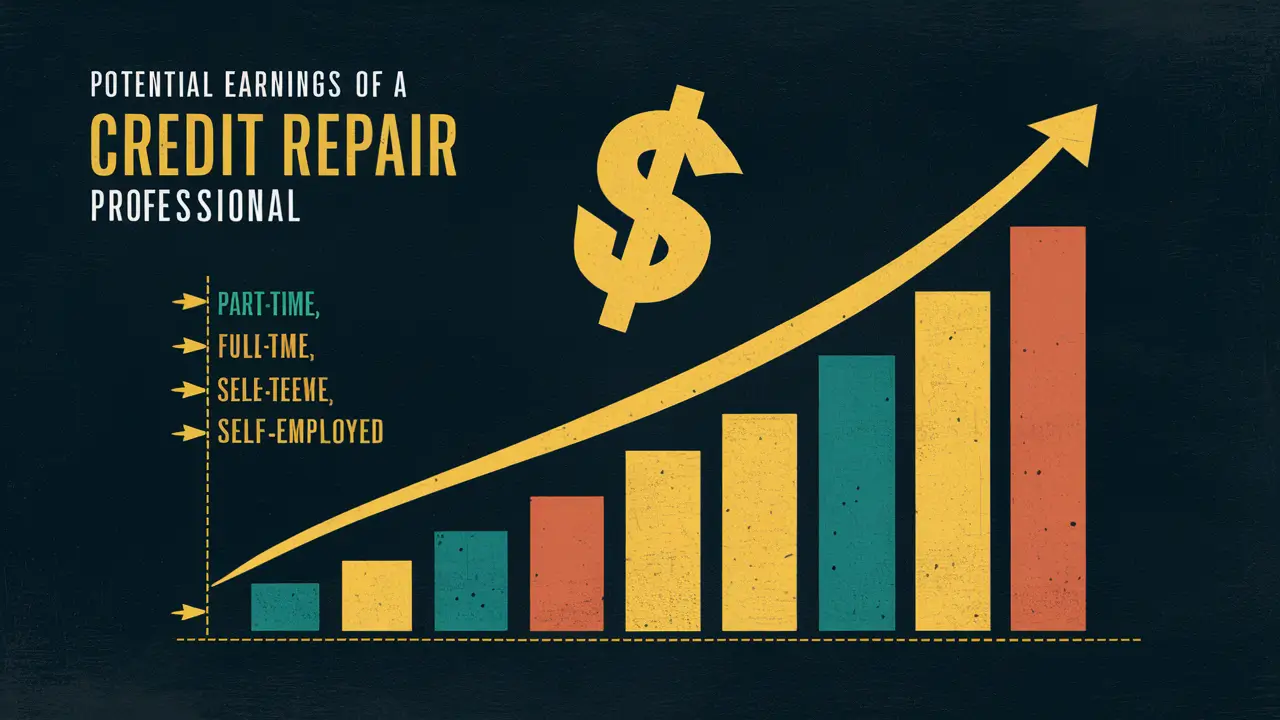-
Posted on: 25 Jul 2024

-
A healthy credit score is vital in today's world. It impacts everything from securing loans and mortgages to renting an apartment and even getting a job. Unfortunately, many people struggle with inaccurate or unfair negative marks on their credit reports. This creates a demand for credit repair services, opening up an interesting business opportunity. But, naturally, the big question is: How much money can you actually make doing credit repair?
Understanding the Credit Repair Landscape
The credit repair industry helps individuals challenge inaccuracies and outdated information on their credit reports with the goal of improving their credit scores. This can involve disputing negative items with credit bureaus, negotiating with creditors, and providing financial literacy education. Before diving into the earning potential, let's understand the factors that influence income.
Factors Influencing Credit Repair Income
Several key factors determine how much money a credit repair business or specialist can earn:
- Pricing Model: Do you charge a monthly fee, a per-item removal fee, or a combination?
- Client Volume: The more clients you serve, the higher your potential income.
- Marketing & Sales: Effective marketing strategies attract more clients and drive revenue.
- Experience & Expertise: Seasoned professionals with a proven track record can command higher fees.
- Operational Efficiency: Streamlining processes and using efficient software can reduce overhead and increase profit margins.
- Location: The cost of living and competitive landscape in your area can influence pricing.
- Compliance & Regulations: Adhering to the Credit Repair Organizations Act (CROA) and other relevant regulations is crucial for long-term success and avoiding legal issues.
- Customer Satisfaction: Positive reviews and referrals drive new business and contribute to sustained growth.
Average Salary Expectations in Credit Repair
It's difficult to pinpoint a single "average" salary for credit repair professionals because income varies widely. However, we can look at different roles and income ranges to get a clearer picture:
Credit Repair Specialist (Employee)
For those working for established credit repair companies, salaries can range from $30,000 to $60,000 per year. This often depends on experience level, location, and the specific company. Some companies may also offer commission or bonuses based on performance.
Credit Repair Business Owner
This is where the real potential for high earnings lies. As a business owner, your income is directly tied to your effort, marketing effectiveness, and operational efficiency. Income can range from $50,000 to $200,000+ per year or more for successful, well-managed businesses. Some incredibly successful firms even generate millions in revenue annually. However, it's important to remember that building a profitable business takes time, dedication, and a solid business plan.
Factors Impacting Business Owner Income
As a credit repair business owner, several factors will play a huge role in your profitability:
- Client Acquisition Cost: How much does it cost you to acquire each new client? Lowering this cost is crucial.
- Client Retention Rate: How long do clients stay with your service? Longer retention means more predictable income.
- Overhead Costs: Rent, software, marketing, and other expenses can eat into profits.
- Service Delivery: Providing excellent service that delivers results is essential for customer satisfaction and referrals.
Pricing Models and Income Potential
The pricing model you choose will significantly impact your revenue stream. Here are some common options:
Monthly Subscription
This is a popular model where clients pay a recurring monthly fee for ongoing credit repair services. This provides a stable and predictable income stream. Monthly fees can range from $50 to $150+ per month, depending on the scope of services offered. To illustrate: if you have 100 clients paying $100 per month, that's $10,000 in monthly revenue.
Pay-Per-Deletion
This model charges clients a fee for each negative item successfully removed from their credit report. Fees can range from $50 to $100+ per item. While this model can be attractive to clients who only want to address specific issues, it can be less predictable for the business owner.
Hybrid Model
This combines elements of both monthly subscriptions and pay-per-deletion. For example, clients might pay a monthly fee for basic services and then additional fees for specific tasks or challenges. This allows for a balance of predictable income and the potential for higher earnings based on results.
Strategies to Maximize Your Income in Credit Repair
Here are some actionable strategies to help you maximize your income in the credit repair industry:
- Develop a Comprehensive Marketing Plan: Invest in online marketing, social media, content marketing, and local networking to attract new clients.
- Offer Excellent Customer Service: Go above and beyond to provide personalized attention and support to your clients. Happy clients are more likely to refer you to others.
- Streamline Your Processes: Use credit repair software and other tools to automate tasks, improve efficiency, and reduce errors.
- Build Relationships with Affiliates: Partner with real estate agents, mortgage brokers, and other professionals who can refer clients to you.
- Stay Up-to-Date on Industry Regulations: Continuously educate yourself on the Credit Repair Organizations Act (CROA) and other relevant laws to ensure compliance.
- Specialize in a Niche: Consider focusing on a specific niche market, such as student loan debt repair or medical debt repair, to differentiate yourself from the competition.
- Offer Value-Added Services: Consider offering additional services such as credit monitoring, financial literacy education, or debt management counseling to increase the value you provide to clients.
- Invest in Training and Education: Continuously improve your knowledge and skills by attending industry conferences, taking online courses, and earning certifications.
- Track Your Key Performance Indicators (KPIs): Monitor your client acquisition cost, client retention rate, and other important metrics to identify areas for improvement.
- Build a Strong Online Presence: Create a professional website, maintain active social media profiles, and solicit online reviews to enhance your credibility and attract more clients.
The Importance of Compliance and Ethics
It's crucial to emphasize that operating a credit repair business requires strict adherence to legal and ethical guidelines. The Credit Repair Organizations Act (CROA) protects consumers from fraudulent and deceptive practices. Violating CROA can result in significant fines and legal penalties. Always be transparent with clients about your services, fees, and the potential outcomes. Avoid making guarantees or promises that you cannot fulfill. Building a reputation for honesty and integrity is essential for long-term success in this industry.
The Future of the Credit Repair Industry
The demand for credit repair services is likely to remain strong in the coming years. Economic uncertainty, increasing debt levels, and the growing complexity of the credit reporting system are all factors that will contribute to this demand. Furthermore, technological advancements and the rise of online platforms are creating new opportunities for credit repair businesses to reach a wider audience and offer more efficient services.
However, the industry is also facing increased scrutiny from regulators and consumer advocacy groups. Businesses must adapt to evolving regulations and prioritize ethical practices to maintain their credibility and long-term viability.











